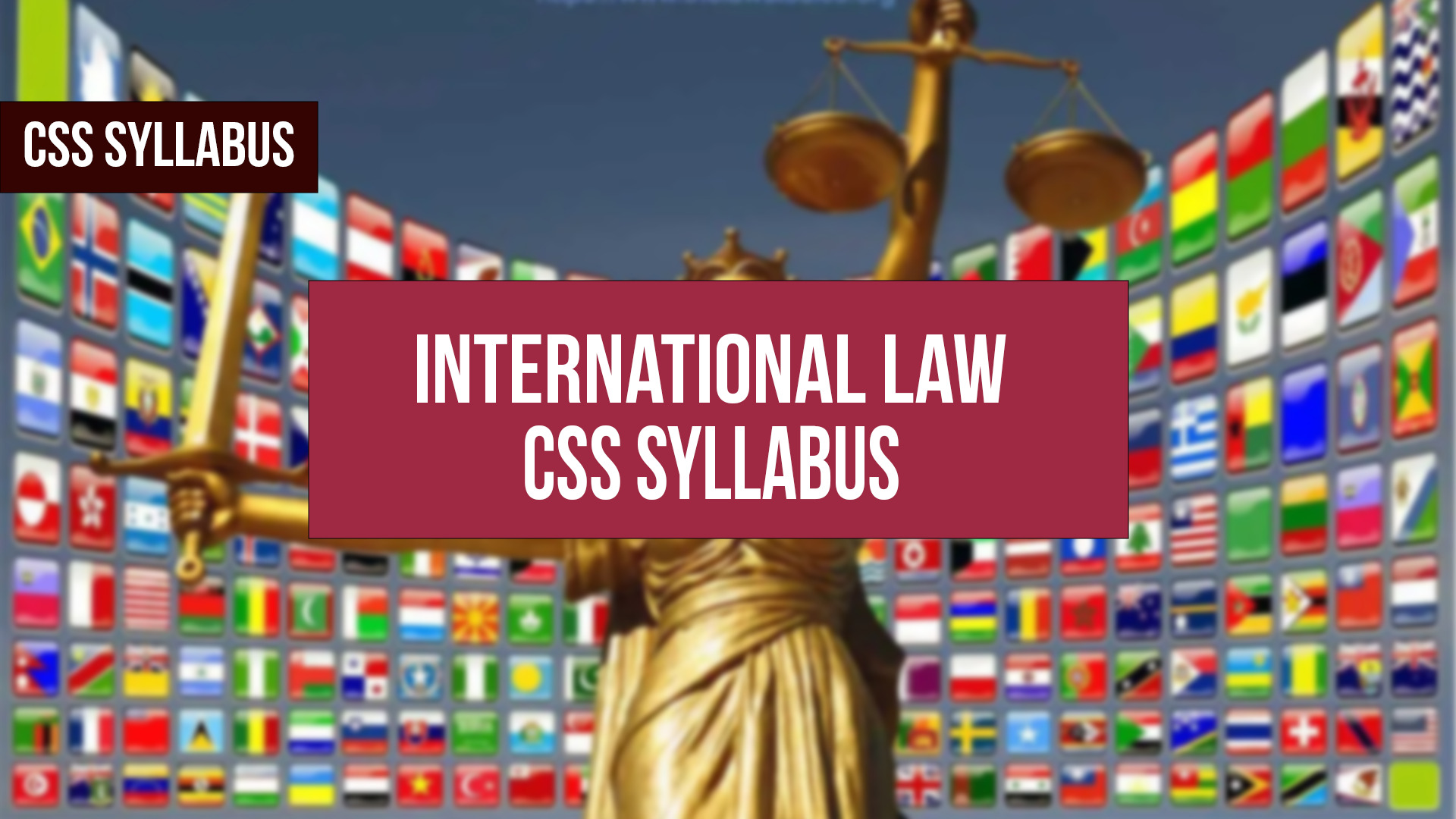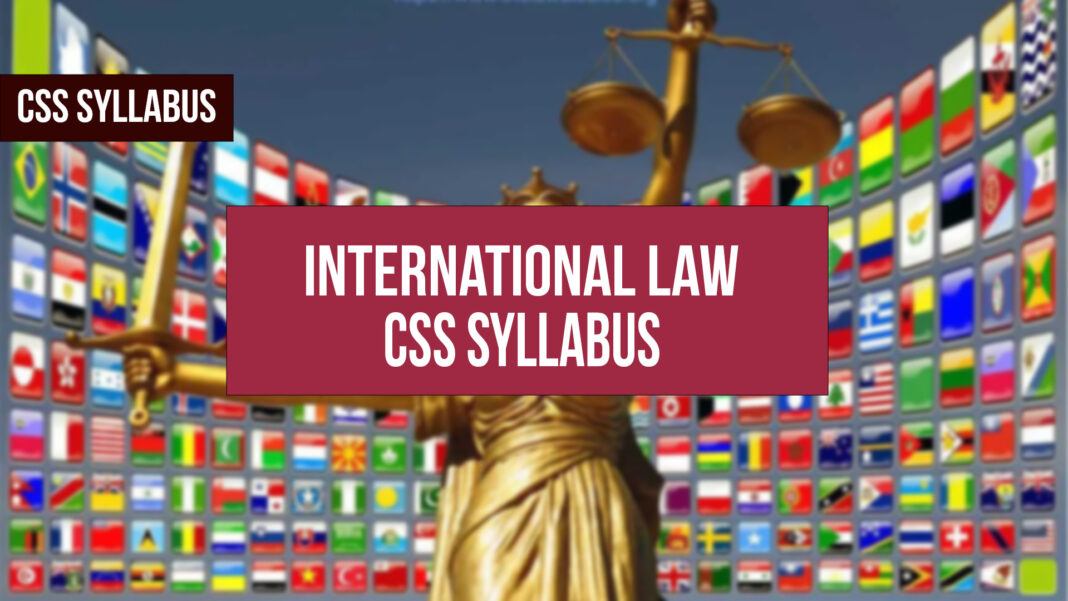The CSS examination, particularly in the realm of international law, demands a profound understanding of complex legal frameworks and contemporary global issues.

Understanding the CSS Syllabus
CSS encompasses a diverse range of subjects, and international law stands out as a pillar of this examination. Aspirants must grasp the weightage of international law in the overall evaluation and understand how it interconnects with other subjects in the syllabus.
CSS International Law Syllabus:
Nature and Sources of International Law:
Definition and Nature of International Law
Sources of International Law (Treaties, Custom, General Principles, Judicial Decisions, and Scholarly Writings)
Subjects of International Law:
States
International Organizations
Individuals
State Jurisdiction:
Territorial Sovereignty
Nationality and Statelessness
Jurisdictional Immunities
Law of Treaties:
Formation and Termination of Treaties
Reservations
Vienna Convention on the Law of Treaties
State Responsibility:
Responsibility of States for Internationally Wrongful Acts
Consequences of State Responsibility
International Organizations:
Nature and Purpose
Membership and Representation
Powers and Functions
Peaceful Settlement of Disputes:
Negotiation, Mediation, and Conciliation
International Court of Justice
Arbitration
Use of Force:
Principles Governing the Use of Force
Collective Security and the United Nations
Human Rights in International Law:
Universal Declaration of Human Rights
International Covenant on Civil and Political Rights
International Covenant on Economic, Social, and Cultural Rights
International Environmental Law:
Principles of Environmental Protection
Treaties and Conventions on Environmental Issues
International Criminal Law:
Jurisdiction of International Criminal Courts
Core Crimes (Genocide, Crimes Against Humanity, War Crimes)
Current Issues in International Law:
Cybersecurity
Climate Change
Terrorism and Counterterrorism
Key Concepts in International Law
Sovereignty, treaties, and the International Court of Justice (ICJ) are foundational concepts. Delve into the implications of sovereignty and the role treaties play in shaping international relations. Understanding the functions and jurisdiction of the ICJ is crucial for answering exam questions effectively.
Breaking Down CSS Exam Structure
Success in CSS exams requires a strategic approach to both written and viva voce components. Explore tips on how to prepare for each section, ensuring a comprehensive and well-rounded performance.
In-Depth Analysis of International Law CSS Syllabus
International law’s historical evolution, coverage of contemporary issues, and practical applications are vital aspects to master. Gain insights into how these elements contribute to a deeper understanding of the subject.
Effective Study Techniques
Navigate the challenges of CSS preparation with effective study techniques. Utilize mind maps, engage in mock exams, and harness the benefits of group study to optimize your learning experience.
Effective Preparation Strategies
Structured Study Plans
Crafting a meticulous study plan is imperative for CSS success. Break down your preparation into manageable sections, allocating specific time to each CSS-related topic. Consistency is key.
Resource Optimization
Identify and utilize top-notch resources for CSS preparation. This includes authoritative textbooks, online platforms, and recent legal publications. A curated collection of materials will streamline your CSS studies, ensuring you cover all essential aspects.
Mock Exams and Self-Assessment
Integrate mock exams into your study routine. Regular self-assessment allows you to gauge your progress, identify weak areas, and refine your CSS preparation strategy accordingly.
CSS Exam Day Strategies
Time Management
The CSS exam demands astute time management. Develop a strategy to allocate time to each section effectively. Prioritize questions based on your strengths, maximizing your potential score.
Answering Techniques
Mastering the art of answering CSS questions is as crucial as understanding the content. Adopt a clear and concise writing style. Use case studies, examples, and legal precedents to bolster your responses.
Common Challenges Faced by Students
Time management, deciphering complex legal terminology, and balancing multiple subjects are common hurdles. Learn practical strategies from successful candidates who have overcome these challenges.
FAQs about International Law CSS Syllabus
How often is the syllabus updated?
The CSS syllabus undergoes periodic updates to stay current with evolving legal landscapes.
Are case studies essential for preparation?
Yes, integrating case studies into your preparation enhances practical understanding.
How to approach viva voce questions?
Viva voce success lies in combining theoretical knowledge with real-world application.
Is memorization the key to success?
While memorization is essential, understanding the underlying concepts is equally crucial.
Can international law be a career path post-CSS?
Absolutely, many CSS graduates pursue successful careers in international law globally.
How does the syllabus adapt to global changes?
The CSS syllabus is designed to adapt, ensuring aspirants stay abreast of dynamic global developments.
Conclusion
Embark on your CSS journey with confidence, armed with a thorough understanding of the international law syllabus. Continuous learning and a passion for the subject will undoubtedly lead you to success.

Editor Timesglo
Editor can be reached at editortimesglo@gmail.com






